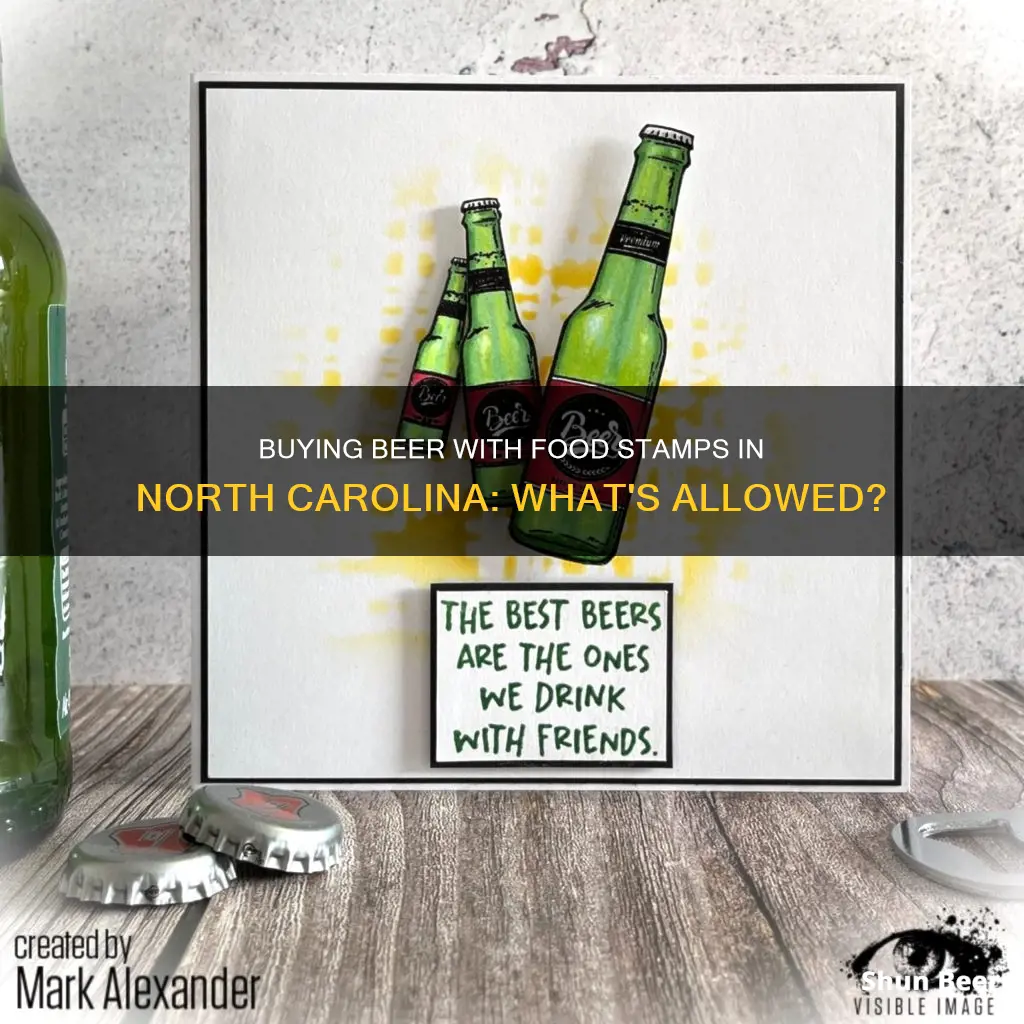
Food and Nutrition Services (FNS), formerly known as Food Stamps, is a program that helps eligible North Carolina residents with limited incomes and resources to supplement their budgets so they can purchase food. The benefits are provided through an Electronic Benefit Transfer (EBT) card, which works like a debit card and can be used to buy food at stores that accept EBT cards, typically most major grocery stores. While the program allows for the purchase of a wide range of food items, there are certain restrictions in place. So, can you buy beer with food stamps in North Carolina?
| Characteristics | Values |
|---|---|
| Can you buy beer with food stamps in NC? | No |
| What can you buy with food stamps in NC? | Fruits and vegetables, meats, fish and poultry, seeds and plants which produce food for the household to eat, infant formula, cereals, juices, baby food in boxes and jars, energy drinks with a nutrition facts label, non-hot coffee, shellfish |
| What can you not buy with food stamps in NC? | Baby diapers or baby wipes, beer, wine or liquor, cigarettes or tobacco, nonfood items such as pet foods, soaps, paper products, household supplies, vitamins and medicines, food that will be eaten in the store, grooming items or cosmetics, energy drinks with a supplement facts label, generally live animals and birds, hot foods |
What You'll Learn

What are North Carolina's food stamps now called?
In North Carolina, food stamps are now referred to as Food and Nutrition Services (FNS). FNS is a program that helps eligible people with limited incomes supplement their budgets so they can purchase food. The benefits are given on an Electronic Benefit Transfer (EBT) card, which works like a debit card and can be used at USDA-authorized retailers, including most major grocery stores.
The amount of benefits received through the FNS program depends on several factors, such as the number of people in the household and the total income. To be eligible for FNS benefits in North Carolina, individuals must be U.S. citizens or have been lawfully admitted to the U.S. if they are not citizens, and they must live in the state. Additionally, they must have or have applied for a Social Security number, and the total gross household income must be below the limit for the household size.
The application process for FNS involves submitting an application and completing an interview with a caseworker. The application requires documentation and information about the household, including identification, Social Security numbers, income, and expenses. The caseworker will determine eligibility, the amount of benefits, and the next steps during the interview.
It is important to note that not all individuals living in a household need to apply for FNS benefits, but the benefits received will depend on the combined gross income of all individuals who apply. The sooner an individual applies for FNS benefits, the sooner they will receive them.
Cheese Dip with a Kick: Beer and Cheese Combo
You may want to see also

What are the eligibility requirements for food stamps in North Carolina?
Food and Nutrition Services (FNS), also known as Food Stamps, is a program that helps eligible people with limited incomes supplement their budgets so they can buy food. FNS eligibility is determined by income, household size, assets, and other factors. The benefits are given on an EBT card, which works like a debit card and can be used to buy food at stores that accept EBT cards.
Residency
You must be a North Carolina resident and a U.S. citizen or have a certain legal status. Undocumented immigrants are not eligible.
Income and Resource Limits
For most people, FNS eligibility has limits on the income you and others in your household can receive. Additionally, there are limits on how much money and property ("resources") you can have. You may still qualify if you work part-time, make a little money, or own a home or car. After you apply, caseworkers determine which limits apply to you and whether certain deductions (like medical and/or shelter expenses) might help you qualify.
Social Security Number
You must have a Social Security number or have applied for one.
Criminal History
People convicted of certain drug-related felonies may not be eligible.
Student Status
College students are not eligible unless they meet certain work requirements or exceptions. If you are a student between the ages of 18 and 51 and are enrolled at least half-time in an institution of higher education, you might be eligible for SNAP. In addition to general and household income requirements, you must meet at least one of the following exemptions:
- Work at least 20 hours a week in paid employment.
- Participate in a state or federally-financed work-study program.
- Participate in an on-the-job training program.
- Care for a child under the age of 6.
- Care for a child aged 6 to 11 and lack the necessary childcare to enable you to attend school, work 20 hours a week, or participate in work-study.
- Be a single parent enrolled full-time in college and taking care of a child under 12.
- Receive Temporary Assistance for Needy Families (TANF) assistance.
Work Requirements
If you're an adult without kids and you're able to work, you might have to work or take part in a work program to keep receiving benefits.
Beer Availability at ASU Football Games
You may want to see also

What can you buy with food stamps in North Carolina?
Food and Nutrition Services (FNS), formerly known as Food Stamps, is a program that helps eligible people with limited incomes and resources in North Carolina supplement their budgets so they can purchase food. The benefits are given on an EBT card, which works like a debit card and can be used at most major grocery stores that accept EBT cards.
- Breads, cereals, fruits, and vegetables
- Meats, fish, poultry, and dairy
- Bottled water and non-alcoholic beverages
- Seeds and plants that produce food
- Infant formula, juices, and baby food in boxes and jars
- Energy drinks with a nutrition facts label
The following items cannot be purchased with FNS:
- Beer, wine, liquor, cigarettes, or tobacco
- Any non-food items such as pet foods, soaps, paper products, and other household supplies
- Vitamins, medicines, and supplements
- Foods that are hot at the point of sale or prepared foods
- Live animals (except shellfish, fish removed from water, and animals slaughtered prior to pick-up from the store)
Buying Beer at Sanford Stadium: What You Need to Know
You may want to see also

What can't you buy with food stamps in North Carolina?
Food stamps in North Carolina are now known as Food and Nutrition Services (FNS), and are provided via an Electronic Benefit Transfer (EBT) card. This card can be used to buy food at stores that accept EBT cards, and most major grocery stores are USDA-authorized retailers.
There are several things you cannot buy with food stamps in North Carolina. These include:
- Alcoholic drinks, including beer, wine, and liquor
- Tobacco products, including cigarettes and cigars
- Non-food items, including pet foods, soaps, paper products, and other household supplies
- Vitamins, medicines, and supplements
- Hot foods or foods already prepared
- Live animals (except shellfish, fish removed from water, and animals slaughtered prior to pick-up from the store)
Additionally, food stamps cannot be used to purchase energy drinks with a supplement facts label, as these are classified as supplements by the FDA.
Buying Beer in Kansas: Sunday Shopping Laws Explained
You may want to see also

How do you apply for food stamps in North Carolina?
Food and Nutrition Services (FNS), also known as Food Stamps, is a program that helps eligible people with limited incomes supplement their budgets to purchase food. The benefits are given on an Electronic Benefit Transfer (EBT) card, which works like a debit card. You can use it to buy food at stores that accept EBT cards.
Gather Documents and Information:
- Identification for you or the head of the household (e.g., driver's license, birth certificate, or other government-issued ID)
- Social Security Numbers, birthdates, and citizenship status for each household member
- Information on income and resources for each person (e.g., cash, bank accounts, investments, retirement accounts)
- Household's monthly bills, including childcare, child support, and disabled adult care
- Medical bills for household members over 60 or who are disabled
- Proof of income for each person
- Paperwork or IDs from other benefits received, such as Medicaid, SSI, or WFFA (also known as TANF)
Submit the Application:
There are three ways to apply for FNS benefits:
- Online with ePASS: You may need to create an account first. You can watch a helpful video for a step-by-step guide to the ePASS application process.
- In-person: Visit your local Department of Social Services (DSS) office. Fill out as much of the paper application as possible ahead of time and take your documents with you. You can also drop off the completed application at the DSS office.
- By Mail: Fill out and mail the paper application to your local county DSS office.
Interview with a Case Worker:
After submitting your application, a case worker will contact you to schedule an interview. This interview can be in person, by telephone, or through a video conference. They will discuss your eligibility, the amount of benefits you can expect, and the next steps.
Remember, your benefits will be calculated from the date your application is received, even if it is not complete. So, don't delay your application while gathering all the required information.
Cheapest Beer: Where to Buy and Save
You may want to see also
Frequently asked questions
No, you cannot buy beer, wine, or liquor with food stamps in North Carolina.
You can buy fruits and vegetables, meats, fish, and poultry, seeds and plants that produce food, infant formula, cereals, juices, and baby food.
You cannot buy alcoholic beverages, cigarettes or tobacco, non-food items such as pet foods, soaps, paper products, household supplies, vitamins, medicines, hot foods, or grooming items or cosmetics.
To apply for food stamps in North Carolina, you need to be a U.S. citizen or have been lawfully admitted to the U.S. if you are not a citizen. You should also live in North Carolina and have a social security number or have applied for one. The total gross household income should be less than the appropriate gross income limit for the household size.







